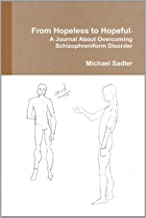Schizophreniform Disorder
Schizophreniform disorder is a type of psychotic illness with symptoms similar to those of schizophrenia, but lasting for less than 6 months. Like schizophrenia, schizophreniform disorder is a type of “psychosis” in which a person cannot tell what is real from what is imagined.
Cluster Number:
Wiki Number: PW196
Diagnosis: Schizophreniform Disorder
US Patients:
World Patients :
Sex Ratio:
Age Onset: M, 18-14; W, 18-3
Brain Area:
Symptoms: On month of schizophrenic events while the schizophrenia diagnosis requires at least 6 months. Start as only 1/5th as many as full.
Progression: The levels of disease and shorter duration are less than full schizophrenia. But 2/3 later develop full schizophrenia.
Causes: genetic and stress-triggers; more likely with other family members with schizophrenia
Medications: antipsychotics
Therapies: individual, family and ocuppational therapies can reduce the impact
Youtube Video: Schizophreniform Disorder
Amazon or Library Book: From Hopelessness to Hopeful: (Schizophreniform Disorder)
Click the book to link or order from Amazon.

